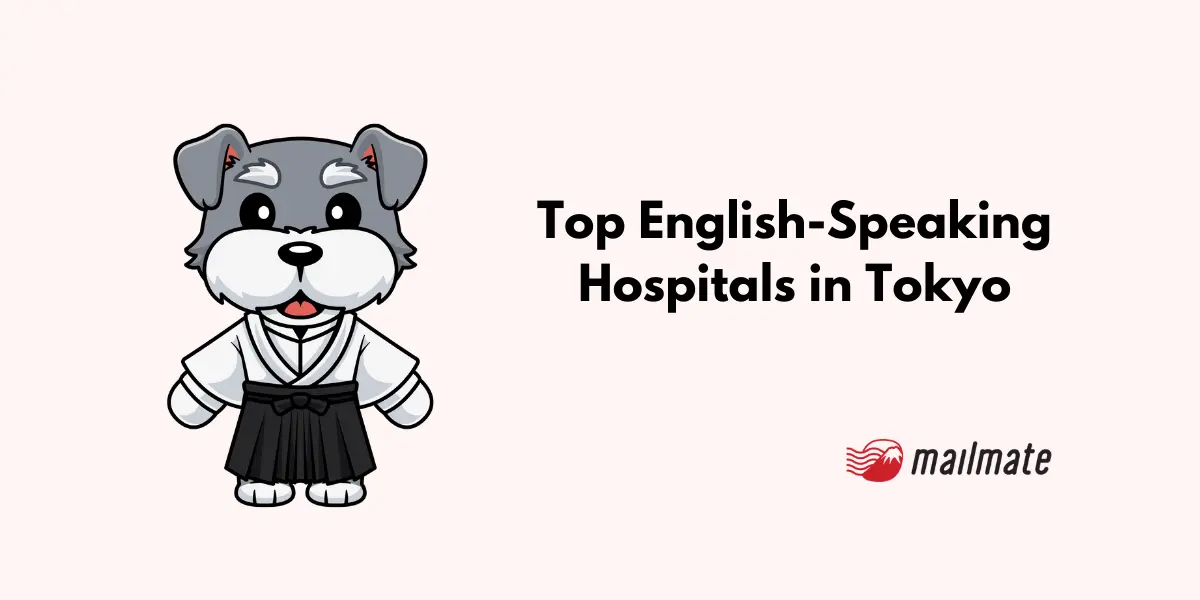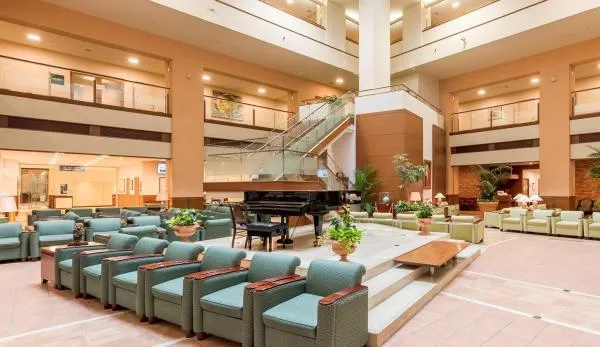8 Top English-Speaking Hospitals in Tokyo

Finding English-speaking hospitals in Tokyo can be one of the biggest challenges for tourists and foreign residents in Japan.
When seeking medical attention, language barriers cause anxiety and can even limit the options for non-native Japanese speakers.
Fortunately, many doctors speak English in Japan, and we've curated a list of the best hospitals in Tokyo that provide English support.
We also discuss what you should know about certifications and accreditations that hospitals receive for their ability to offer multilingual consults.
Bookmark this page so you'll know where to turn in the future!
Where can I find an English-speaking doctor in Tokyo?
You can find an English-speaking doctor in Tokyo by checking if the facility is Japan Medical Service Accreditation for International Patients (JMIP) or Japan International Hospitals (JIH) certified. This accreditation ensures hospitals can assist patients of various nationalities and offer multilingual consultations.
For foreign residents in other areas of Japan (not just Tokyo), looking for “JMIP hospital near me” can help you pinpoint where to go for multilingual support.
Of course, if you don't have a JMIP or JIH hospital close to you, some hospitals offer English translation services or have doctors on-site who can speak English.
Note: If you or someone you know becomes injured or falls ill, please refer to the Tokyo EMS Guide to determine if you should call an ambulance for assistance or visit a hospital.
Below, we've compiled a list of 8 hospitals and clinics in Tokyo that are JIH and JMIP certified or offer English-language support for you to use as a guide when seeking medical attention.
1. Tokyo Takanawa Hospital

Image. Takanawa Hospital reception.
Tokyo Takanawa Hospital is a 3-minute walk from Takanawadai Station. It is JIH and JMIP certified and provides English and Chinese interpretation services.
Although you don't need an appointment for a first-time consultation, the hospital recommends calling in advance to ensure there are openings in the schedule.
Services include internal medicine, orthopedic surgery, neurosurgery, dermatology, urology, ophthalmology, otorhinolaryngology, and oral surgery.
Address | Reception: 03-3443-9191
Access: Takanawadai Station, Asakusa subway line, Exit A1; Shinagawa Station, Keikyu and JR line, Takanawa Exit
2. Sanno Hospital

Image. Sanno Hospital reception area.
Sanno Hospital has English-speaking doctors and Japanese-English interpreters on staff. It's less than a 5-minute walk from Aoyama-itchome Station and Nogizaka Station. The hospital has a wide array of patient-oriented medical services, including dentistry, ophthalmology, breast surgery, psychosomatic medicine, and a respected obstetrics & gynecology department.
Outpatient walk-ins are accepted for specific departments. You can check which departments accept walk-ins on their Outpatient page. Reception hours are from 8:30 - 11:30 AM and 1:00 - 4:30 PM on Mondays to Saturdays.
Address | Reception: 03-3402-3151
Access: Aoyama-itchome Station, Tokyo Metro Ginza line, Hanzomon line, and Toei Oedo line, Exit 4; Nogizaka Station, Tokyo Metro Chiyoda line, Exit 3
3. International Health Care Clinic

Image. International Health Care Clinic receiving area.
This clinic provides multilingual treatment and medical services for non-life-threatening illnesses and injuries, regardless of whether you have Japanese health insurance or not. As an overseas travel clinic, they also offer international medical transportation between countries and within hospitals in Japan.
The International Health Care Clinic requires a reservation in advance. To schedule your consultation, you can request an appointment through their website form or email them.
Address | Reception: 03-3501-1330
Access: Shimbashi Station. JR Yamanote line, Ueno-Tokyo line, Ginza line; Uchisaiwaicho Station, Mita line
4. Tokyo Midtown Clinic

Image. Tokyo Midtown Clinic reception area.
Tokyo Midtown Clinic boasts a special outpatient center and a next-gen health screening center. In addition, the clinic is one of the first hospitals in Japan to be accredited by Joint Commission International (Ambulatory Care Program), an internationally recognized health care organization. They also provide flu shots.
Outpatient service is by appointment only at Tokyo Midtown Clinic. Reservations are available one month in advance through their internet reservation system or by phone call.
Address | Reception: 03-5413-0080
Access: Roppongi Station, Toei Oedo Subway line, Exit 8; Roppongi Station, Tokyo Metro Hibiya line, Exit 4
5. Tokyo Saiseikai Central Hospital

Image. Tokyo Saiseikai Central Hospital reception area.
Tokyo Saiseikai Central Hospital is JMIP-certified and a short walk from Akabanebashi Station. It offers comprehensive medical care for international patients and has an Emergency and Critical Care Center within its premises.
The hospital has an international office that supports patients who don't speak Japanese. Medical interpreters who can speak English, Spanish, French, Portuguese, and Chinese are also available on-site.
Departments include: Internal medicine, neurology, cardiovascular surgery, cardiovascular internal medicine, psychiatry, pediatrics, gynecology, ophthalmology, emergency & Critical Care Medicine, radiology, rehabilitation, etc.
Tokyo Saiseikai Central Hospital encourages patients to make a reservation in advance or have a medical referral letter before visiting. Individuals without one may have to wait considerably longer to receive a consultation.
Address | Reception: +81-(0)50-5358-2873
Access: Akebanebashi Station, Toei Oedo line, Akabanebashi Exit; Shibakoen Station, Toei Mita line, Exit A2; Azabujuban Station, Tokyo Metro Nanboku line, Exit 3
6. Medical Clinic Hiroo

Image. Medical Clinic Hiroo, from Google maps.
The clinic's director, Dr. Michiko Suwa, is a U.S. board-certified pediatrician that has treated patients from more than 60 countries. A broad range of medical services such as pediatrics, internal medicine, respiratory medicine, dermatology, and vaccines are available at the clinic in English.
Walk-ins are accepted, but you will need an appointment for immunizations, physical exams, and well-child visits.
Address | Reception: 03-3443-7060
Access: Hiroo Station, Hibiya Subway line, Exit 2
7. National Medical Clinic

Image. National Medical Clinic’s receptionists.
The National Medical Clinic administers pediatric medicine and pediatric surgery with native English-speaking pediatricians, nurses, and staff. In addition, the clinic also offers general internal medicine, immunization, and cosmetic plastic surgery services.
Although the clinic does not accept Japanese Health Insurance, they will help you complete insurance forms without charge. Appointments are a must for this clinic, so make sure you call reception to make a reservation.
Address | Reception: 03-3473-2057
Access: Hiroo Station, Hibiya Subway Line, Exit 1
8. Tokyo Medical and Surgical Clinic

Image. Tokyo Medical and Surgical Clinic’s receptionist.
The Tokyo Medical and Surgical Clinic has multilingual European and U.S.-trained doctors working at the facility. English-speaking medical services include family practice, specialty consultations, vaccinations, travel medicine, minor clinical procedures, and emergencies.
Consultations and first-time visits are typically by appointment only. However, acutely ill patients can be seen without one. This clinic does not accept Japanese National or Social Health Insurance, but they will provide an itemized receipt and statement of your diagnosis for insurance claims.
Address | Reception: 03-3436-3028
Access: Kamiyacho Station, Hibiya Subway line, Exit 1
Read also:
👉How to Pay National Health Insurance in Japan
👉Forgot to Pay Japan NHI? Here’s What Happens
Frequently asked questions
What are some top English-speaking hospitals in Tokyo?
Some of the top English-speaking hospitals in Tokyo include Tokyo Takanawa Hospital, Sanno Hospital, International Health Care Clinic, Tokyo Midtown Clinic, and Tokyo Saiseikai Central Hospital.
Are there hospitals in Tokyo with multilingual support?
There are hospitals in Tokyo that offer multilingual support. These include JCHO Tokyo Takanawa Hospital, NTT Medical Center Tokyo, IUHW Mita Hospital, Tokyo Saiseikai Central Hospital, and Toranomon Hospital.
Are there English-speaking clinics in Tokyo?
There are English-speaking clinics in Tokyo such as Tokyo Takanawa Hospital, Sanno Hospital, International Health Care Clinic, Tokyo Midtown Clinic, etc.
Are there any hospitals in Tokyo listed on Wikipedia?
There is a list of hospitals in Tokyo on Wikipedia which includes the Center for the Mentally and Physically Handicapped, Ebara Hospital, International Catholic Hospital (Seibo Hospital), and Japanese Red Cross Medical.
Where can I find an English-speaking doctor near me?
Check out Medical Excellence Japan, which lists English speaking medical institutions.
What services do Japanese hospitals offer?
Japanese hospitals offer various types of medical treatments, and both inpatient and outpatient services. Additionally, hospitals will often have an on-site convenience store and restaurant.
What should I know about going to a Japanese hospital?
In Japan, adults under national health insurance pay 30% of medical costs, with a monthly cap based on income.
Where can I find information about international hospitals in Japan?
Japan Medical Service Accreditation for International Patients (JMIP) or Japan International Hospitals (JIH) websites both provide a list of international hospitals in Japan.
What can I expect from a hospital stay in Japan?
Hospitals have strict rules, including limited shower times and regular night checks by nurses. Meals typically consist of white rice, fish/tofu/meat, soup, vegetables, and milk, and are not covered by insurance. For serious treatments, a family member is required for explanations and consent. In case of unplanned hospital stays, you may rely on family or friends for necessities, though hospitals can provide some essentials for a fee.
Do Japanese hospitals accept traveler's insurance?
Japanese hospitals and clinics generally do not accept foreign health insurance directly. Instead, they require payment out of pocket at the time of service. However, if you have travel insurance that covers medical expenses, you can typically seek reimbursement from your insurance provider after paying for the services.
It's important to note that the specifics can vary depending on the insurance plan, so it's recommended to check the details of your travel insurance policy before your trip. Also, keep in mind that medical care in Japan can be expensive, so having a plan that provides adequate coverage is crucial.
In closing
Knowing where to turn in case of future emergencies can help alleviate the stress of future unknowns. (See also, “Top Options for English-Speaking Insurance Companies for Emergencies in Japan.”)
If none of these English-speaking hospitals in Tokyo felt right for you, look through the facility list on the Japan Medical Service Accreditation for International Patients (JMIP) or Japan International Hospitals (JIH) websites.
Spending too long figuring out your Japanese mail?
Virtual mail + translation services start at 3800 per month. 30-day money-back guarantee.

